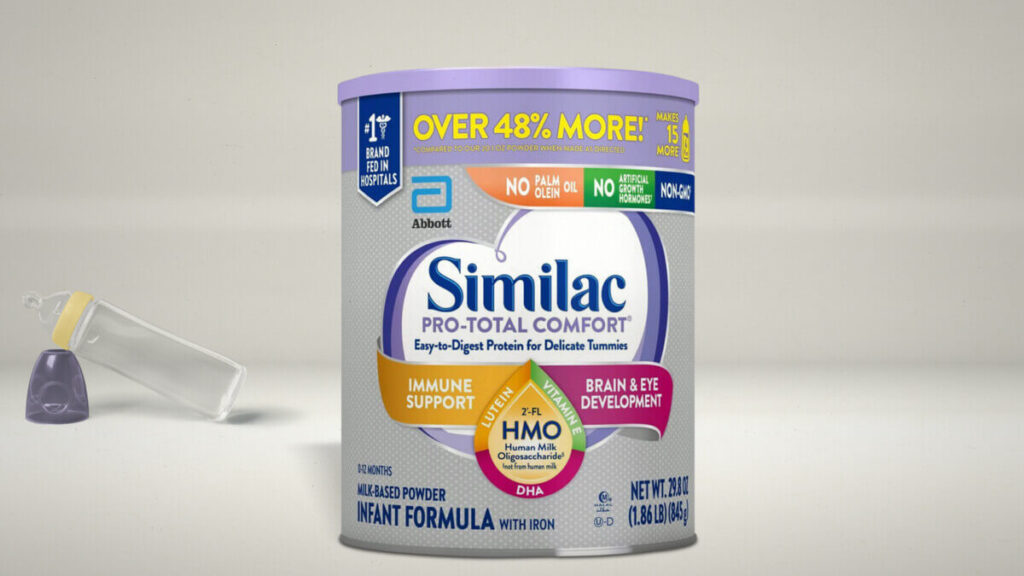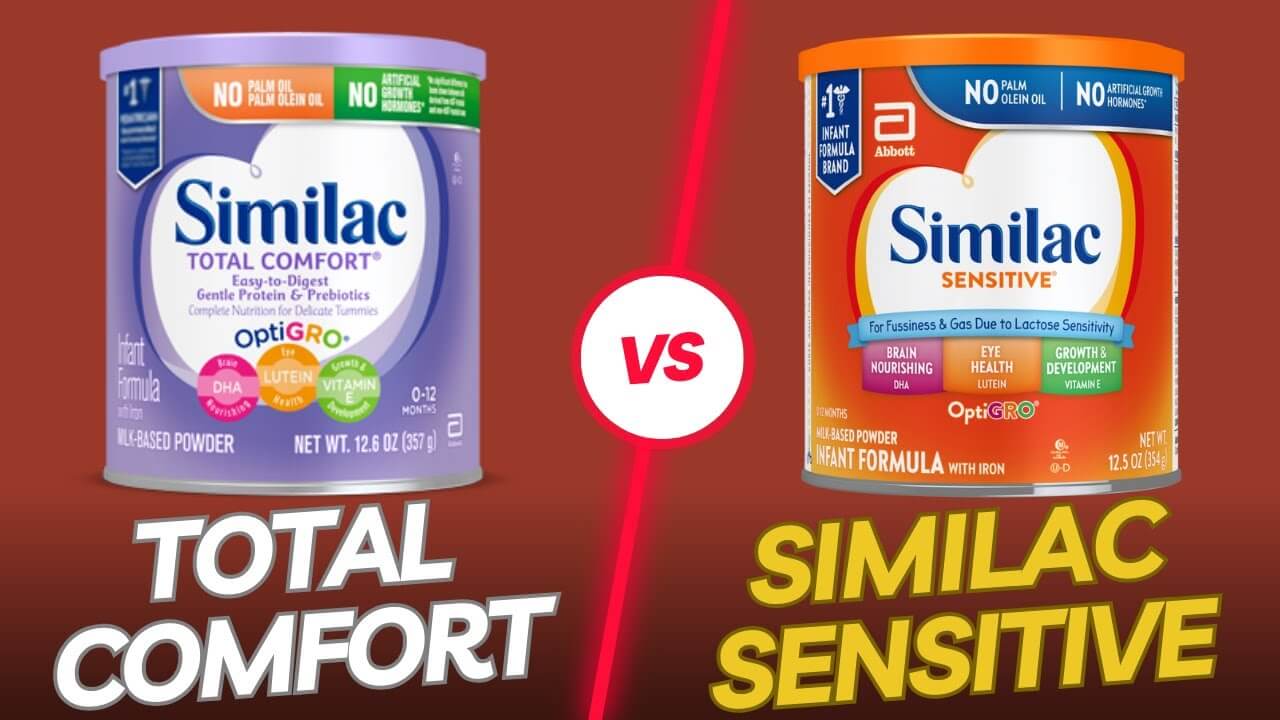Once you complete all those baby naming research and other parenting stuff you will realize that’s not the end. Another important decision making lies in the best formula selection. Every mother has to pass through this phase in their early motherhood.
And truly speaking this can even be a hard task for you if your baby is intolerant to some ingredients.
For example, offering an inappropriate(better to say incompatible) formula can deteriorate the situation if your baby is already struggling with fussiness.
This in fact will get your and your baby’s mood down. So, in these cases what can be the ultimate solution? If there is any.
Well as a mother when I faced the same situation with my little boy, I shifted to Similac sensitive and Similac total comfort.
Now, you might be wondering what lead me to do so? Right?
Actually, they are a trusted brand for other Mammas like me. Moreover, they are even suggested by pediatricians as these are the best choices of formula, especially for a baby who has a sensitive tummy.
But confusion still arises here. I get it.
Right now, you read both Similac sensitive and Similac total comfort is good for sensitive tummies but which one should you choose among these two? Is it the question striking your mind?
If yes, there’s nothing to worry about. This post is all about Similac sensitive vs total comfort and to guide you which fits perfectly for your little one.
But before that, let’s get an overview of Similac sensitive.

Similac Sensitive Overview: Infant formula milk for sensitive babies
Basically, Similac Sensitive is manufactured for those babies who have a sensitive tummy and struggle a lot while handling the regular formula milk.
This product is great for those infants who get associated with gas and fussiness in their tummy when they fail to digest lactose or proteins which are part of the regular formula.
The primary reason for the build-up of gas in the tummy is the incapacity or inability of those little tummies in digesting those ingredients of the formula. This may result in fussiness and those stomach discomfort may make your little one cry for an extended length of time.
Ingredients present in Similac Sensitive
What makes this Similac pro Sensitive different from other regular formulas, might be a question in your mind.
Well, this Similac Sensitive is prepared with the isolate of milk protein rather than regular cow milk. Eventually, this formula gets to contain reduced lactose which is in fact gentler for little sensitive tummies. Though still, it can be still a struggle and hurdle for some babies.
To make the digestion process with ease the formula has a lactose contribution of only 2 % of its overall composition. Eventually, in Similac, this lactose is replaced with corn maltodextrin and supply carbs (carbohydrate source) to the child.
Additionally, the formula is fortified with OptiGRO, the ultimate blend of DHA, lutein, and Vitamin E which is usually found in Breast milk as well.
The building block that prepares for healthy eyes and development of the brain is the DHA which constitutes about 93% in the eyes and 97% in the brain.
The function of the brain and health 0f the eyes is the responsibility of Lutein. In the brain, it can be found in the high amount where it equates with memory and early learning.
The antioxidant properties almost similar to breast milk are held by Vitamin E and they are responsible for the proper development of cells, eye sights, healthy skin, and body immunity.
Altogether, this Similac is almost referenced with human milk or breast milk during the formulation process for incorporating the child with all the essential nutrients which they need for healthy growth(baby’s growth). It doesn’t conclude artificial hormones (artificial growth hormones) and comes with human milk oligosaccharides or human breast oligosaccharides for baby grow.
Similac Total Comfort
This Similac total comfort is also manufactured for those children who have sensitive tummies but with more specific problems like protein digesting issues or digesting lactose (lactose sensitivity) which is usually found in regular milk. It is for easy digestion and baby’s tummy friendly special formula to get rid of fussy periods.
So, it is a great yes, product if your baby struggling to digest other milk-based infant formulas.
Ingredients
What makes this Similac total comfort different from other regular formulas? Whey Protein Hydrolysate is the answer. In replacement for regular milk protein, this Similac Total comfort contains Protein Hydrolysate.
However, if you are a mom who is not much interested in fitness, then the term “Whey” would seem to be an out-of-the-world thing. But it’s not that complex. Actually, the cow’s milk protein which goes through extensive hydrolysis and gets reduced to inhibit allergic reactions is somewhat known as to be the Whey protein.
But you must have noticed that I coined the term “fitness” as it is extensively used in the fitness industry. But in Formulas, the Whey Protein is almost similar to that of Breast milk, thanks to tailoring which is done to reduce the protein intolerance chances.
Unlike Similac pro sensitive the contains of casein is absent in this Similac total comfort thus making it even more digestible and easy food for your little one’s little tummy can easily handle.
Apart from that, the use of corn syrup is also absent in this formula (which is used to serve as the source of carbohydrates). However, as an alternative, the presence of Maltodextrin is found in this formula and it is the non-GMO ingredients plant-sourced.
Additionally, very similar to Similac sensitive the OptiGRO is present which contains Lutein, DHA, and Vitamin E. The healthy eye and brain development purpose is served by this OptiGRO.
Meanwhile, there are a few more worthy ingredients to mention, that as prebiotics to serve the soft bowel movement and Nucleotides for a strong healthy immune system or immune support. But the complete absence of GMO ingredients used in the process of formulation is quite impressive.

Similac sensitive vs Total Comfort
The whole cow milk or simply let’s say cow’s milk which is usually available in the market consist of two types of milk proteins. One is Whey and the other is Casein. Among these two milk proteins, one gets digested faster than the other.
Can you guess which one gets digested faster?
Yes, you are right if you guessed “whey”. Casein is a slow-digesting protein whereas Whey is the fast-digesting one.
So, I guess it might be clear which one among the two milk formulas sensitive similac and Similac total comfort should get digest faster on the basis of protein type contains.
If it still appears to be complex, let me break it down further.
The Similac sensitive formula contains both the milk proteins ( it contains both whey protein as well as casein protein) whereas Similac total comfort contains only Whey (the fast-digesting protein)
So, which one gonna offer faster digestion? Of course the Similac total comfort.
That is why some Moms might witness some issues in their baby’s digestion while using Similac sensitive due to the presence of complex casein protein and not with Similac Total comfort.
But it doesn’t end here.
The Similac Total comfort is made more digestion-friendly for those babies who face trouble in digesting sugar content as this formula is prepared in absence of corn syrup.
However, in the case of Similac Sensitive corn syrup is included in the list of primary ingredients which implies your baby does need to digest the sugar content( corn syrup) as well.
Meanwhile, both of these formulas have a weird type of smell in common. You will witness a tin like smell in Similac Sensitive and a bit sharp smell in the case of Similac Total comfort.
Apart from the exclusive blend ingredients and partially broken down proteins digestion difference between the Similac Total comfort vs Similac sensitive, the price point is also a comparable topic which as Mother I think should be considered.
Here Milk formula Similac pro Sensitive is a bit price-friendly (I mean to say, it is cheaper) as a pack of 3 whereas Total Comfort is a bit pricey as a pack of 4.
Final Verdict on Similac Sensitive vs Similac Total Comfort
In my opinion, as a Mother of a baby boy, I would go with the Milk formula Similac Total Comfort for my sensitive babies tummy in infant formula as regular Similac formulas(milk based formulas) do trouble a lot in protein digestion (formula milk) due to lactose intolerance or lactose sensitivity.
The low sugar content makes this product an impressive formula(the right formula for baby’s body) to pick in the first go besides providing a huge benefit to those babies who owns sensitive tummies.
Apart from that, the absence of Casein in Similac Total Comfort is also an important point to consider especially for a baby who faces trouble in digestion. The breakdown9digesting, I mean here) of casein lacking food is much easier than breaking down food that contains casein.
This results in easy digestion which implies less fussy periods, and gas, and also improves bowel movement. The benefit in colic, constipation, and spit-up problems are somewhat also tackled through this tummy-friendly food.
But that doesn’t mean Similac Sensitive is out of the race. It is also a good formula for fussiness and gas despite its decent sugar content levels. Just it may not fit good for gentle tummies and digestion troubles many times.
Both are Sensitive stomach friendly pro sensitive formula not both casein is content in them. But they are capable of vital nutrients or complete nutrition in liquid form formula even in partially hydrolyzed protein.
In the end, it’s the response of the baby itself to the digestion of the formula ingredients. Eventually, a start with Similac sensitive vs Similac Total Comfort can help you understand better digestion of your baby in milk protein isolate, and then, what’s stopping you from exchanging these exclusive blend two formulas for your baby’s immune system or immune support or try gluten free different formulas?. This will get rid of liquid form formula related persistent feeding issues in your baby’s stomach.
More to read:
Exploring Sleep Disorders Tests: When Should You Get Tested
Does Medicare Cover Sleep Apnea Tests? Understanding Your Options

